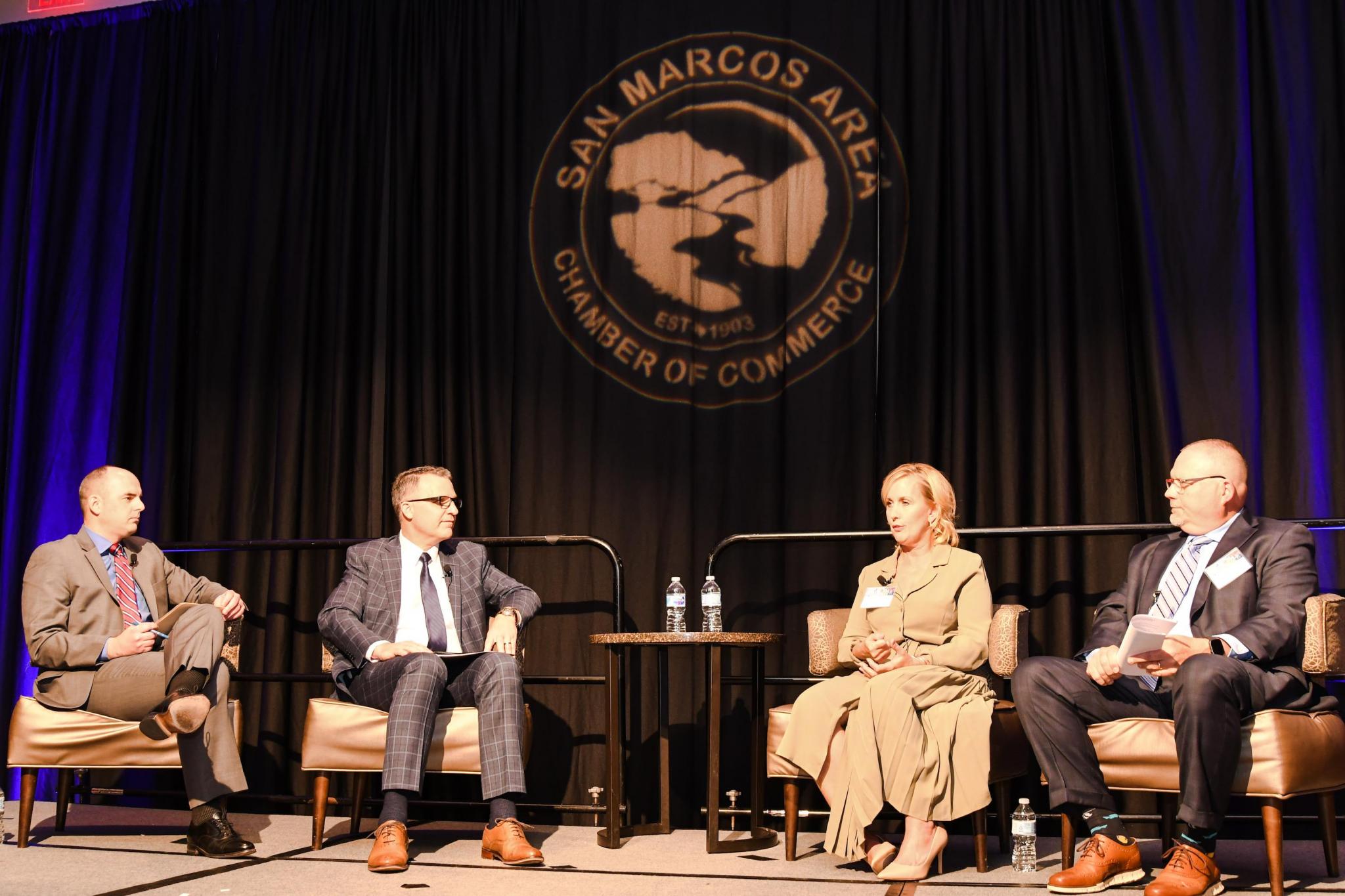
From left to right, San Marcos Area Chamber of Commerce President Jason Mock, CTMC President Anthony Stahl, Director of Translational Health Research Initiative at Texas State University Dr. Melinda Villagran and CEO of Workforce Solutions Rural Capital Area Paul Fletcher hold a discussion on health and workforce on Thursday. Daily Record photo by Lance Winter
Experts talk healthcare, workforce at Chamber of Commerce luncheon
The current state of health in the United States is unsustainable, according to Central Texas Medical Center President and CEO Anthony Stahl.
Stahl, along with CEO of Workforce Solutions Rural Capital Area Paul Fletcher and Director of Translational Health Research Initiative at Texas State University Dr. Melinda Villagran, spoke at the San Marcos Area Chamber of Commerce’s State of Health and Workforce luncheon on Thursday.
“Our (healthcare) costs are staggering,” Stahl said. “We’re in the red on procedures, especially on surgery and imaging. This really must change, it is not sustainable … To spend as much as we spend in our nation, and yet still found wanting worldwide, it is something that we have to think about and meditate on. We’ll have to change.”
Stahl mentioned three healthcare trends that should be watched: Consumer trends, f trends and physician trends.
“All of us are consumers,” Stahl said. “I think you would agree we want convenience. We clearly want the convenience such as Amazon gives us, and that is coming … The expectation is no wait, I’d like to sit at home and be taken care of. If any of you have met with your primary care physician in the comfort of your own home, I don’t think you want to go back to waiting in an office with other sick individuals.”
Stahl also discussed a Community Needs Assessment conducted by CTMC, St. David’s Healthcare and Ascension Health. He said the data found shows things are turning in the wrong direction, which is increasing healthcare costs and creating more primary care visits. Three priorities were developed through the assessment: Access to affordable healthcare, healthcare management and lifestyle, and chronic disease management.
Stahl concluded his discussion on health by looking at the healthcare workforce. According to Stahl, there is an increasing deficit of physicians.
“We will have a deficit of 140,000 physicians in our nation in the next five years,” Stahl said. “That’s really a devastating number. We need more physicians going into study and into practice, especially tending toward the rural areas … We can see that the healthcare industry is a large industry and truly it will continue to grow in the foreseeable future.”
Fletcher followed Stahl with a discussion on the state of workforce. Fletcher said that with the unemployment rate hovering around 3% in the U.S., jobs are available in Texas.
“If you’re in Texas today and you want a job, you got a job,” Fletcher said. “It may not be the job you really want, it may not be the job that leads to a career but it’s definitely an economy in which everybody can gain.”
Fletcher said a challenge Workforce Solutions Rural Capital Area faces is helping people who are employed upscale their level of job.
“There’s lots of jobs available in entry-level jobs — cashiers, retail, front desk line jobs — that you can easily move from one job to another,” Fletcher said. “It’s hard to bridge that skills gap and then move up to a higher level job where you start going up exponentially and you start building a career path.”
Fletcher said healthcare and social systems and manufacturing are leading industries in Texas and around the San Marcos region.
Following Fletcher’s lecture on workforce, the luncheon closed with a panel discussion with Stahl, Fletcher and Villagran to discuss health, healthcare and the workforce.
Villagran said building relationships and creating diverse environments in the workforce will help improve the state of healthcare and the workforce.
“Relationships, making sure you have relationships that build a network, and relationships that will allow us to access talent pools and access information and access healthcare relationship and how to build those and sustain those,” Villagran said. “I think that that’s real key. The other one is making sure that you have diverse voices in the room. I mean, it is a fact we are living in a diverse community … and that’s a good thing because innovation doesn’t happen if you’re all think the same things and come from the same place and have done it the same way forever. Diversity brings new ways of thinking, new ways of doing things.”











